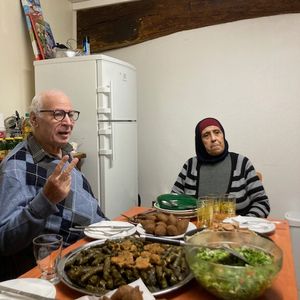"Our families come from the village of Tantura in Palestine. On the night of 22 May 1948, Zionist militias attacked the village and killed several hundred men, imprisoned others and deported women and children. Our families were expelled to Syria. My husband and I were born near Damascus. We are Palestinians but we have never been able to return to our village, to our home. We’ve lived our whole lives abroad and we’re part of the first generation of the ’Nakba" [1] who learnt their culture, history and traditions from previous generations. My father used to get us together every Friday evening and he and other elders would tell us stories about our family, our ancestors. We talked, sang, danced and cooked together.
When my husband and I started our family, it was our turn to pass on everything we had received.
Life for Palestinian refugees in Syria was not easy. We were never able to obtain Syrian nationality. We worked as teachers in Saudi Arabia for a few years, but it wasn’t much easier. There too, we remained "Palestinian refugees". When we returned to Syria, at the start of the civil war, the Yarmuk refugee camp where we lived suffered terrible massacres. We were forced to flee again. This time we found refuge in Lebanon. After nine years living in a camp, it was possible to come to France through a humanitarian corridor set up by the Community of Saint Egidio. We now live in Taizé. We’re very happy to be here, but since 7 October we’ve been living in anguish again. My sister and her family are in Gaza. She and her husband are retired teachers.
The bombardments drove them out of Gaza City. They followed all those fleeing towards the south. They hoped to find some safety in Khan Younes but were forced to return to Rafah. The news, when there is any, is not good. They live under a tarpaulin. They lack everything: water, food, electricity and internet. They are sick, tired and scared. The bombing continues.
We don’t know what our future will be. We ask Allah to help us... Please pray for us. We never had the chance to live on our own land, but Palestine lives in our hearts and minds".

Wesal (70) and Mohamed (70)
 TAIZÉ
TAIZÉ